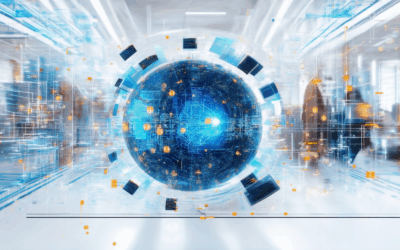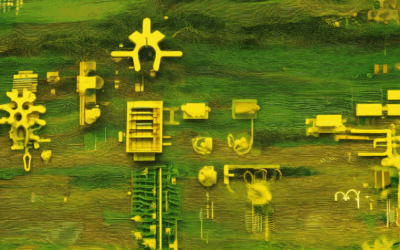The pace of technological innovation continues to accelerate, shaping a world that feels increasingly futuristic with each passing year. As we stand on the brink of 2050, the possibilities for technology are vast, promising to transform every aspect of our lives. From groundbreaking advancements in healthcare and energy to revolutionary developments in artificial intelligence and sustainable living, the future of technology is poised to redefine how we live, work, and interact with the world around us. This exploration delves into the most exciting predictions and innovations that promise to shape tomorrow’s landscape, offering insights into how technology will continue to evolve and impact society.

What Technology Would Be In The Future?
The future of technology is vast and unpredictable, but we can speculate based on current trends and emerging innovations. Here are some technologies that are likely to play significant roles in the coming years:
1. Artificial Intelligence (AI) and Machine Learning
Artificial intelligence continues to evolve rapidly, with advancements in machine learning, natural language processing, and autonomous systems. Future developments may lead to more sophisticated AI systems capable of solving complex problems, generating creative content, and interacting with humans in more intuitive ways.
2. Quantum Computing
Quantum computing holds the promise of revolutionizing industries such as cryptography, drug discovery, and optimization. While still in its early stages, quantum computers have the potential to solve problems currently deemed intractable, offering breakthroughs in scientific research and economic growth.
3. Virtual and Augmented Reality (VR/AR)
Virtual and augmented reality technologies are expected to become more accessible and integrated into everyday life. Applications in gaming, education, healthcare, and real estate are likely to expand, providing immersive experiences that enhance productivity and entertainment.
4. Blockchain and Distributed Ledger Technology
Blockchain technology, known for its secure and decentralized nature, is poised for further innovation. Beyond financial applications, it may be applied in supply chain management, identity verification, and smart contracts, driving efficiency and trust across various sectors.
5. Internet of Things (IoT) and Edge Computing
The Internet of Things, combined with edge computing, will enable smarter devices and systems. This integration will allow for better data analysis, decision-making, and real-time responses, leading to more efficient and adaptive environments in homes, cities, and industries.
6. Biotechnology and Synthetic Biology
Advances in biotechnology could lead to synthetic biology, enabling the design and construction of novel organic molecules for medical, energy, and manufacturing purposes. This field has the potential to transform industries ranging from healthcare to agriculture.
7. Advanced Materials Science
Research into advanced materials, such as graphene, carbon nanotubes, and metamaterials, may unlock unprecedented possibilities in electronics, renewable energy, and structural engineering. These materials could lead to faster processors, more efficient batteries, and stronger building materials.
8. Renewable Energy Storage and Sustainability
As the world focuses on sustainability, advancements in renewable energy storage, such as solid-state batteries and hydrogen fuel cells, will be crucial. These technologies aim to make clean energy more reliable and accessible, supporting global efforts to combat climate change.
9. Metaverse and Decentralized Virtual Worlds
The metaverse, a persistent virtual space, is expected to grow in popularity, offering new platforms for social interaction, work, and entertainment. Decentralized virtual worlds may emerge, providing users with greater control over their online experiences and digital identities.
10. Space Exploration and Colonization
Future technologies may facilitate human colonization of other planets, with advancements in spacecraft design, propulsion systems, and life support systems. These innovations could pave the way for long-term human presence in space and the exploration of distant galaxies.
By staying informed about these emerging technologies, we can better prepare for the changes they will bring and leverage them to create a better future for humanity.
What Technology Will Be Used in 2050?
The year 2050 promises to be a transformative era driven by groundbreaking technological advancements. Here are some key technologies expected to shape our world:
- Quantum Computing: Quantum computers will revolutionize fields like cryptography, drug discovery, and optimization, solving problems currently deemed intractable.
- Metaverse and Augmented Reality: The metaverse will become a pervasive part of daily life, blending virtual and physical realities, with AR enhancing productivity and entertainment alike.
- Nanotechnology: Nanobots will likely be used in medical diagnostics, construction, and environmental cleanup, offering unprecedented precision and efficiency.
- Human Brain-Computer Interfaces: Advanced BCIs will enable direct communication between the human mind and machines, unlocking new ways to interact with technology.
- Driverless Technology: Autonomous vehicles will dominate roads, reducing accidents and traffic while reshaping urban planning and logistics.
- Artificial Intelligence: AI systems will continue to evolve, assisting in decision-making, creative processes, and monitoring global systems like climate control and energy distribution.
- Workplace Automation: Robotic and autonomous systems will optimize industries, leading to shifts in job markets and the rise of new economic models centered on human-AI collaboration.
- Robotics: Advanced robots will perform tasks ranging from manufacturing to healthcare, enhancing productivity and improving quality of life through personalized care and efficient labor solutions.
These innovations will profoundly impact every aspect of life, from healthcare and education to transportation and energy. The integration of these technologies will drive progress across sectors, fostering a more connected, efficient, and sustainable world. For deeper insights into how these technologies may shape tomorrow’s landscape, explore Iterati ‘s comprehensive coverage of emerging trends and innovations.

Which Technology Is Best for the Future?
When considering which technologies are most promising for the future, it’s essential to evaluate emerging trends and their potential to drive innovation and societal progress. Here are some key technologies that are expected to play significant roles in shaping tomorrow’s world:
- Artificial Intelligence (AI): AI continues to advance rapidly, with applications ranging from healthcare diagnostics to autonomous vehicles. Its ability to process vast amounts of data and learn from experiences makes it a cornerstone of future technological development.
- Quantum Computing: Quantum computers have the potential to solve complex problems much faster than classical computers, revolutionizing fields like cryptography, drug discovery, and optimization.
- Blockchain Technology: Blockchain is transforming industries by providing secure, decentralized systems for transactions and data storage. Its applications in finance, supply chain, and governance are vast and growing.
- Internet of Things (IoT): The integration of sensors and connectivity in everyday devices promises to enhance productivity, efficiency, and personal convenience across various sectors.
- Renewable Energy Technologies: As the world focuses on sustainability, advancements in solar, wind, and hydrogen energy technologies are critical for combating climate change and ensuring a sustainable future.
- Biotechnology and Synthetic Biology: These fields are unlocking new possibilities in medicine, agriculture, and bioengineering, offering solutions to global challenges like disease eradication and food scarcity.
- Space Exploration and Colonization: Efforts to explore Mars and establish human presence in space are pushing the boundaries of science and engineering, potentially leading to new materials and energy sources.
- Cybersecurity: With increasing reliance on digital systems, robust cybersecurity measures are essential to protect sensitive data and infrastructure from malicious actors.
While each of these technologies holds immense potential, the “best” technology for the future may depend on the specific application and societal need. A combination of these innovations is likely to drive the most transformative changes, as they intersect to create integrated solutions for global challenges.

Future Technology in 2030
The year 2030 is expected to bring significant advancements in various fields, driven by technological innovations. Here are some key areas projected to shape the future:
- Artificial Intelligence (AI): AI systems will likely become more integrated into everyday life, assisting with tasks like healthcare diagnostics, autonomous vehicles, and personal productivity tools. Advanced AI models may also enhance creativity and decision-making capabilities.
- Quantum Computing: Quantum computers are expected to solve complex problems faster than traditional supercomputers, revolutionizing fields like cryptography, drug discovery, and financial modeling.
- Renewable Energy: Solar, wind, and hydrogen energy will dominate global power generation, with significant advancements in storage solutions and grid efficiency.
- Biotechnology: CRISPR-Cas9 and other gene-editing technologies may lead to breakthroughs in medicine, treating genetic disorders and enhancing agricultural resilience.
- Space Exploration: Private companies will likely achieve Mars colonization, with reusable rockets and advanced propulsion systems becoming standard.
- Robotics: Autonomous robots will play crucial roles in manufacturing, logistics, and healthcare, optimizing workflows and improving patient care.
- Internet of Things (IoT): Billions of interconnected devices will streamline smart cities, enabling efficient resource management and improved urban planning.
- Augmented Reality (AR)/Virtual Reality (VR): AR and VR will continue to immersive experiences, enhancing education, gaming, and remote work possibilities.
- Cybersecurity: As connected devices grow, cybersecurity will remain a top priority, with advanced protection measures against ransomware and data breaches.
- Smart Cities: Urban areas will leverage AI and IoT to improve transportation, waste management, and public safety, creating more livable environments.
These advancements will undoubtedly shape our world, driving progress across industries and improving daily life. Staying informed about emerging technologies will be essential for anyone looking to thrive in the coming decades.
What’s the Next Big Thing in Technology?
The pace of technological innovation continues to accelerate, and 2025 promises to bring groundbreaking advancements across various sectors. Here are some of the most promising trends and innovations expected to shape the future:
- Generative AI : Building on the momentum of recent breakthroughs, generative AI is poised to become even more versatile. From creating lifelike synthetic images and videos to generating custom content, this technology will redefine creativity and personalization across industries.
- Quantum Computing : The development of stable, large-scale quantum computers is nearing reality. Quantum computing has the potential to solve complex problems exponentially faster than classical computers, revolutionizing fields like cryptography, drug discovery, and optimization.
- Advanced Robotics and Autonomous Systems : As autonomous systems mature, we’ll see more robots in manufacturing, delivery, and healthcare. These systems will become more intuitive, efficient, and capable, transforming how we live and work.
- Biotechnology and Synthetic Biology : Synbio is advancing rapidly, enabling the design and construction of novel organisms tailored for specific purposes. Applications could include disease treatments, biofuels, and sustainable materials, offering innovative solutions to global challenges.
- Metaverse and Virtual Reality (VR) : The metaverse is becoming increasingly immersive, with VR and AR technologies blurring the lines between physical and digital worlds. This space will see significant growth in applications ranging from gaming and virtual collaboration to education and remote work.
- Clean Energy Innovation : Renewable energy storage and distribution systems are expected to improve, driven by advancements in battery technology and smart grids. Solar, wind, and hydrogen power will play pivotal roles in achieving a sustainable energy future.
- Space Exploration and Colonization : Private companies are accelerating space exploration, aiming to establish human presence on Mars and other planets. Breakthroughs in spacecraft design, propulsion systems, and life support will push the boundaries of what’s possible in space.
- Digital Twin Technology : Digital twins will become more sophisticated, enabling real-time simulation and analysis of physical systems. This technology will optimize operations in industries like urban planning, healthcare, and manufacturing.
- AI-Powered Healthcare Diagnostics : AI is being integrated into diagnostic tools, improving accuracy and speed in disease detection. This shift will enhance patient care, streamline medical processes, and contribute to personalized medicine.
- Blockchain and Decentralized Systems : Blockchain technology continues to evolve beyond cryptocurrencies. Its applications in supply chain management, secure identity verification, and decentralized finance (DeFi) will expand, driving innovation in financial services and global trade.
As we look ahead, these technologies will not only transform our daily lives but also create new opportunities for innovation and progress. Staying informed about these trends will be crucial for anyone looking to navigate the evolving tech landscape effectively.

What Will the World Look Like in 2050?
The year 2050 represents a future that is still largely undefined but shaped by ongoing technological advancements, societal transformations, and environmental challenges. Here’s a glimpse into what the world might look like:
- Technological Breakthroughs:
- AI and Machine Learning: Advanced systems may handle most complex tasks, revolutionizing industries from healthcare to transportation.
- Renewable Energy: Clean energy sources like solar, wind, and geothermal could dominate global power supplies, significantly reducing carbon emissions.
- Space Exploration: Regular travel to Mars and other planets may become feasible, leading to a new era of space colonization.
- Bioengineering: CRISPR technology and synthetic biology could unlock treatments for diseases and create new materials.
- Societal Changes:
- Population Growth: The global population is projected to reach around 10 billion, necessitating innovative solutions for housing and resource management.
- Urbanization: Smart cities will likely dominate urban landscapes, integrating advanced technologies for efficiency and sustainability.
- Cultural Shifts: A greater emphasis on sustainability and community well-being could influence consumer behavior and societal values.
- Economic Evolution:
- The Global Economy: Emerging markets in Africa, Asia, and South America could drive economic growth, reshaping global trade dynamics.
- Automation: Jobs may be redefined, with robots and AI taking on many manual tasks, leading to new opportunities in creative and service sectors.
- Green Energy Industries: Countries investing heavily in renewable energy infrastructure could lead the global economy.
- Environmental Considerations:
- Climate Action: Efforts to combat climate change could result in a significant reduction of greenhouse gas emissions and improved environmental policies.
- Biodiversity Conservation: Protected ecosystems and wildlife corridors may become more prevalent, supporting biodiversity and ecological balance.
- Water and Food Security: Innovations in agriculture and water management could address food shortages and ensure access to clean water for all.
By 2050, the world will likely be a place where technology and humanity coexist harmoniously, driven by innovation and a shared commitment to sustainability. The journey toward this future requires careful planning, collaboration, and continuous progress in addressing global challenges.




0 Comments